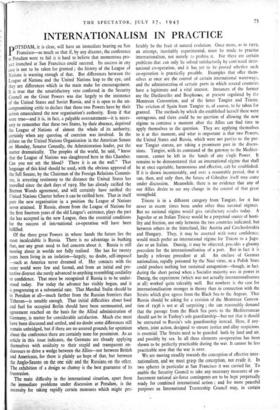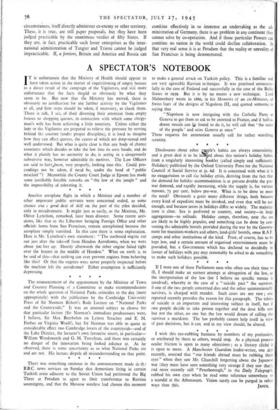INTERNATIONALISM IN PRACTICE
POTSDAM, it is clear, will have an immediate bearing on San Francisco—so much so that if, by any disaster, the conference at Potsdam were to fail it is hard to believe that momentous pro- ject launched at San Francisco could succeed. Its success in any case is not to be taken for granted ; the history of the League of Nations is warning enough of that. But differences between the League of Nations and the United Nations leap to the eye, and they are differences which in the main make for encouragement. It is true that the unsatisfactory veto conferred in the Security Council on the Great Powers was due largely to the insistence of the United States and Soviet Russia, and it is open to the un- compromising critic to declare that those two Powers have by their action emasculated the new organisation's authority. Even if that were true—and it is, in fact, a palpable overstatement—it is neces- sary to remember that these two States; by their absence, deprived the League of Nations of almost the whole of its authority, certainly when any question of coercion was involved. In the debate on the United Nations Organisation in the American Senate on Monday, Senator Connally, the Administration leader, put the matter dramatically. The peoples of the world, he said, " know that the League of Nations was slaughtered here in this Chamber. Can you not set the blood? There it is on the wall." That language of this kind should be used,. with the obvious approval of the full Senate, by the Chairman of the Foreign Relations Commit- tee, is arresting testimony to the distance the United States has travelled since the dark days of 1919. She has already ratified the Bretton Woods agreement, and, will certainly have ratified the United Nations Charter before it can be ratified here. That in itself puts the new organisation in a position the League of Nations never attained. If Russia, absent from the League of Nations for the first fourteen years of the old League's existence, plays the part she has accepted in the new League, then the essential conditions for the success of international co-operation will have been fulfilled.
Of the three great Powers in whose hands the future lies the most incalculable is Russia. There is no advantage in burking that, nor any great need to feel concern about it. Russia is still moving about in worlds not fully realised. She has for twenty years been living in an isolation—largely, no doubt, self-imposed —such as America never dreamed of. Her contacts with the outer world were few and formal, and from an initial and pro- tective distrust she rarely advanced to anything resembling cordiality or confidence. That must be recognised if Russia is to be under- stood today. For today the advance has visibly begun, and it is progressing at a substantial rate. That Marshal Stalin should be in Potsdam at all—much farther from the Russian frontiers than Teheran—is notable enough. That initial difficulties about food and fuel for occupied Berlin should have been surmounted, and agreement reached on the basis for the Allied administration of Germany, is matter for considerable satisfaction. Much else must have been discussed and settled, and no doubt some differences still remain unbridged, but if there are no assured grounds for optimism about the conference there are certainly none for pessimism. As an article in this issue indicates, the Germans are already applying themselves with assiduity to their stupid and transparent en- deavours to drive a wedge between the Allies—not between British and Americans, for there is plainly no hope of that, but between the Anglo-Saxons on the one side and the Russians on the other. The exhibition of a design so clumsy is the best guarantee of its frustration.
The main difficulty in the international situation, apart from the inmiediate problems under discussion at Potsdam, is the necessity for taking rapidly certain measures which might pre- ferably be the fruit of natural evolution. Once more, as in 1919, an attempt, inevitably experimental, must be made to practise internationalism, not merely to profess it. For there are certain problems that can only be solved satisfactorily by cont:nued inter- national co-operation, and it has yet CO be proved whether such co-operation is practically possible. Examples that offer them- selves at once are the control of certain international waterways, and the administration of certain ports in which several countries have a legitimate and a vital interest. Instances of the former are the Dardanelles and Bosphorus, at present regulated by the Montreux Convention, and of the latter Tangier and Trieste. The eviction of Spain from Tangier is, of course, to be taken for granted. The methods by which she established herself there were outrageous, and there could be no question of allowing the new regime to continue a moment after the Allies can find time to apply themselves to the question. They are applying themselves to it at this moment, and what is important is that two Pcwers, the United States and Russia, which were not parties to the pre- war Tangier statute, are taking a prominent part in the discus- sions. Tangier, with its command of the gateway to the Mediter- ranean, cannot be left in the hands of any single Power. It remains to be demonstrated that an international regime that shall be at once equitable, harmonious and effective, cab be established. If it is shown incontestably, and over a reasonable period, that it can, then, and only then, the future of Gibraltar itself may come under discussion. Meanwhile, there is no evidence that any of our Allies desire to see any change in the control of that great stronghold.
Trieste is in a different category from Tangier, for it has never in recent times been under other than national regimes. But no national regime would give satisfactory results today. A Jugoslav or an Italian Trieste would be a perpetual source of hosti- lity and friction, not only between the two countries indicated, but between others in the hinterland, like Austria and Czechoslovakia and Hungary. They, it may be asserted with some confidence, would much prefer an international regime for Trieste to a Jugo- slav or an Italian. Danzig, it may be objected, provides a gloomy precedent for the internationalisation of a port. But in fact it is hardly a relevant precedent at all. An enclave of German nationalism, rapidly poisoned by the Nazi virus, in a Polish State could produce nothing but sustained antagonism—though, in fact. during the short period when a Socialist majority was in power in Danzig, the experiment (which was not actually internationalisation at all) worked quite tolerably well. But nowhere is the case for internationalisation stronger in theory than in connection with the Straits which give egress from the Black Sea to the Aegean. That Russia should be asking for a revision of the Montreux Conven- tion of 1936 is not at all surprising ; she can reasonably demand that the passage from the Black Sea ports to the Mediterranean should not be in Turkey's sole guardianship—but not that it should be entrusted to Russia's sole guardianship instead. Here, if any- where, joint action, designed to ensure justice and allay suspicions, is essential. The Straits need to be guarded both by land and air, and possibly by sea. In all these elements co-operation has been shown to be perfectly practicable during the war. It cannot be less practicable now that the war is over.
We are moving steadily towards the conception of effective inter- nationalism, and we must grasp the conception, not evade it. In two spheres in particular at San Francisco it was carried far. To enable the Security Council to take any necessary measures of en- forcement national air-force contingents are to be kept perpetually ready for combined international action ; and for more peaceful purposes an International Trusteeship Council may, in certain circumstances, itself directly administer ex-enemy or other territory. These, it is true, are still paper proposals, but they have been judged practicable by the unanimous verdict of fifty States. If they are, in fact, practicable such lesser enterprises as the inter- national administration of Tangier and Trieste cannot be judged impracticable. If, a fortiori, Britain and America and Russia can combine effectively in so immense an undertaking as the ad- ministration of Germany, there is no problem in any continent they cannot solve by co-operation. And if those particular Powers can combine, no nation in the world could decline collaboration. In that very real sense it is at Potsdam that the reality or unreality of San Francisco is being demonstrated.



























 Previous page
Previous page